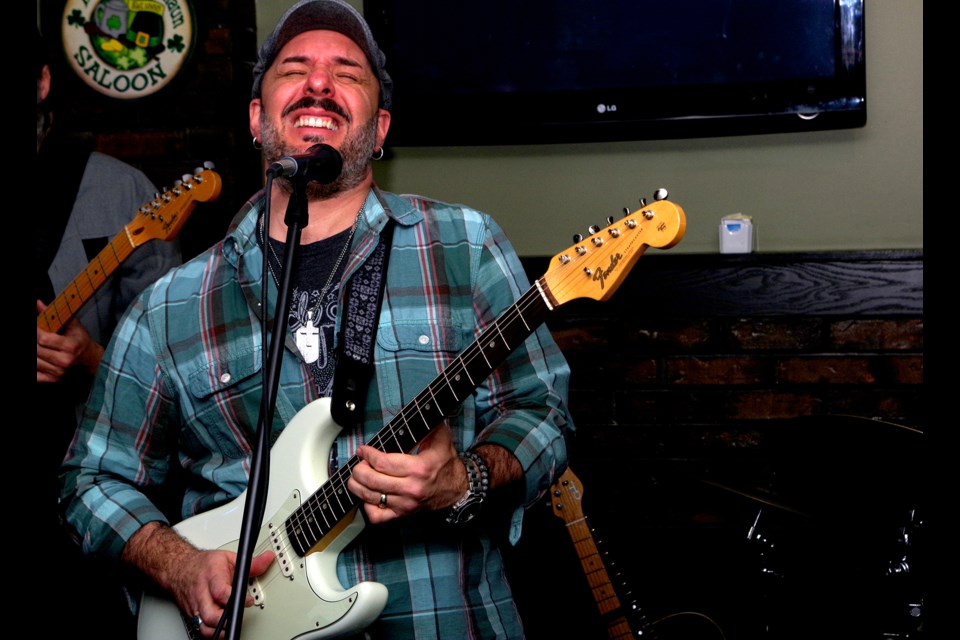The home page of blues artist Mick Hayes website says: “Music born from great influence.”
And that brief but deeply eloquent statement is likely far more intuitive than even Hayes realizes.
It pays homage to musicians who shaped his life and career, but a recent conversation with him while performing at Donnelly’s Pub in Thorold revealed much deeper meaning to the motto.
On stage, Hayes holds the audience in the palm of his hand. The intimate venue and appreciative fans are there to see Mick Hayes.
He is the former leader of the house band at the Lafayette Tap Room in Buffalo and that speaks volume of Hayes' talent and respect in the music community. It was, without question, the quintessential blues club in Buffalo and one of the most famed and played in the country. Everyone who mattered in the blues played there, from BB King and Buddy Guy, to the younger generation greats, including Joe Bonamassa and Derek Trucks.
Lamenting the passing of the Lafayette, he said, "Things are changing in Buffalo. We don’t even have a ‘blues’ club anymore."
But he asked, referring to Thorold specifically, "Is it unusual for a city this size to be holding two blues jams a week? Absolutely, but it’s refreshing. I tell my friends about it. Even when we’re in California, I’ll tell my (musician) friends like Matt Schofield, Josh Smith, and Kirk Fletcher. I tell all my friends, 'Hey, they got a great thing going up there (in Thorold)," before adding, "I’m lucky enough to be here with you guys.”
Blues music rides periodic waves of immense popularity and near obscurity and Hayes acknowledged that his career followed a similar pattern.
His life presents a double-edged sword. He told ThoroldNews, “That’s why I sing and play the way I do. It’s where I’ve been and what I’ve been through.”
Clearly understanding that it shaped him, it also causes grief and often self-doubt. He’s played in front of tens of thousands and opened for superstars like The Doobie Brothers, Peter Frampton, Dickey Betts, Los Lonely Boys, Robin Trower, Survivor, Dave Mason, War, Smoken Joe Kubek, and Michael Burkes.
During this particular performance, he recounted playing a local bar where patrons were more interested in the hockey game. And that, given his passion for music, was hurtful.
He says it’s tough to show up and be the person the audience or venue owner wants, because you also want to show who you are and what your ability is.
"Sometimes there’s the demand, ‘Come on, play something I know, something I can dance to or I’m going across the street to another bar.' On those nights, when people in bars just aren’t listening, I think everything that makes me feel like who I am is just not being viewed. I’m not seen. So I’ll just do me.”
He noted, "I appreciate when you say that I’ve achieved a level of acceptance and accolades, but there are days when I roll out of bed and I think, God, I’m just looking at pushing a train uphill alone again today."
Hayes says while there appears to be a downswing in blues popularity at the moment, it's not necessarily true.
"I don’t think the blues is disappearing. It’s just changing faces," he said, pointing to some newcomer successes like Joe Bonamassa.
"I saw him last time he was in town and he closed with 'Mountain Time.' It’s a great blues songwriter's song. If Bob Seeger recorded it in the 1970s, it would have been a hit song. Blues are changing and sometimes change is progress," he observed.
He said that famed Sun Studio owner and record producer Sam Phillips coined the phrase 'Rhythm and Blues.'
"And he was right," said Hayes; "Music should be wrapped up in one blanket that just feels good. We’ve kind of grown into this time and place and era where music can be anything where there are no labels attached, no sub-genres," he argued. "When you try to book a gig, the owner asks what genre do you play and I ask what if it's just designed to make people feel good? What if people want to hear a song and ask about where it came from?"
But he pointed to the thriving blues scene in Thorold and young players coming along as proof the genre is healthy.
"Look at (teenagers) Hayden Fogle, a former student of mine; he's grown to become his own player, and it makes me happy. And I've seen Spencer Mackenzie here (at Donnelly's Pub). It’s exciting to see the young guys come along."
He wondered how the young players could possible have the experiences to write and play the blues. Hayes has had a tough life and it comes through in his art.
"And for some young people it’s the same - it's what they’ve been through. But for others, it’s a learned trade. It’s something they learned, like learning punctuation in speech. Some people are great speakers and some are not," he offered.
Getting back to the state of the blues, he suggested, "It all comes back around. It depends on how deeply you’re getting into the roots. I can’t listen to Prince without hearing Sly and the Family Stone, and hearing James Brown's influence. And then digging deeper and finding out where they got their influences. So you go back farther and farther into the roots. That’s where you get educated as a singer and as player."
The 40-year-old Hayes shows no signs of slowing down. He's about to release his 10th album and wonders where that will lead him next.
"BB King said it’s real hard to have the blues from the back of a limousine and," he laughed,"I would love to be in that position today."
For more about Mick Hayes, visit:
https://www.mickhayesmusic.com/



